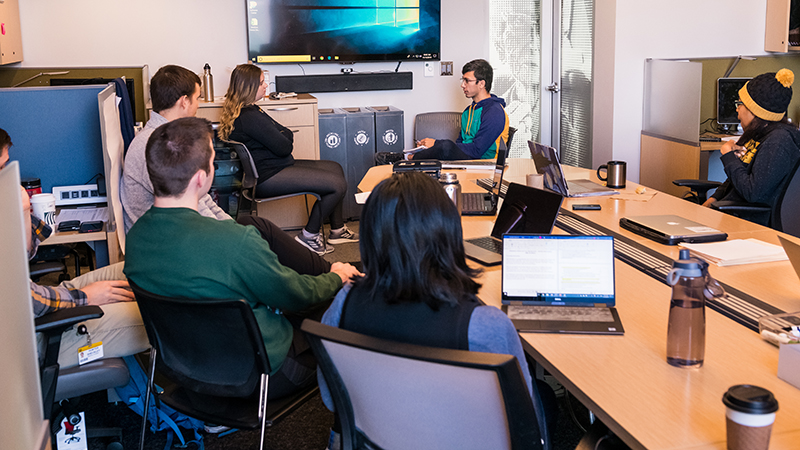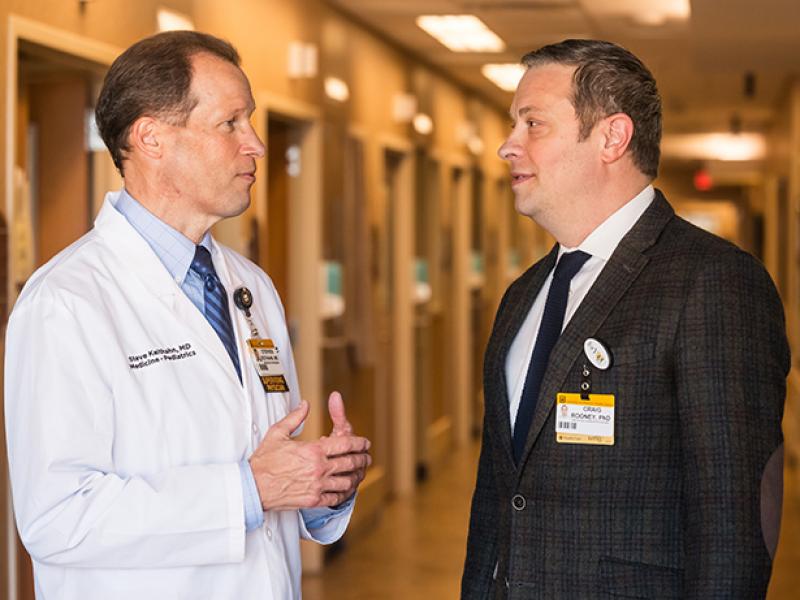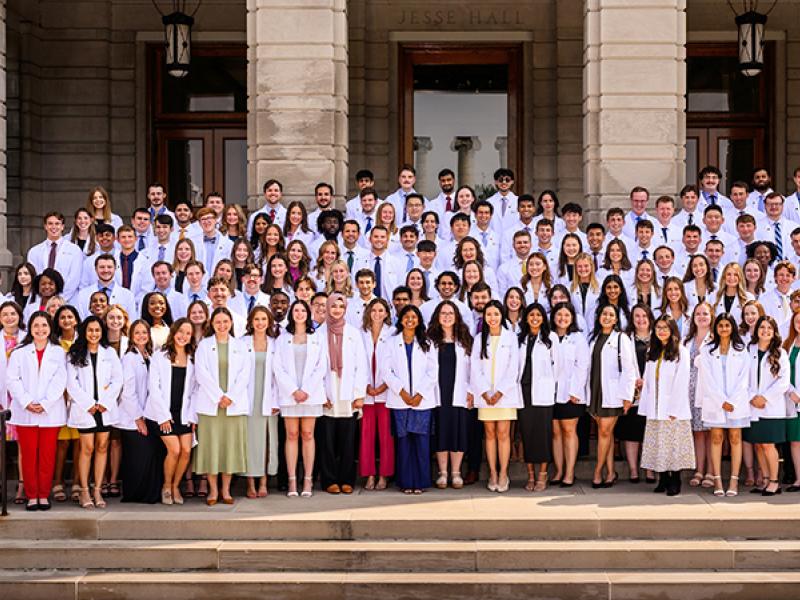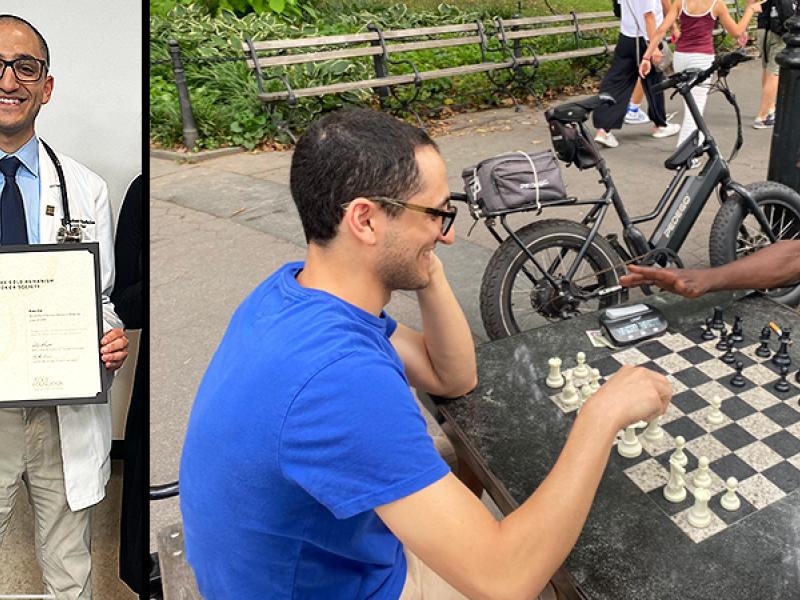
During Aaron Warning’s first two years at the MU School of Medicine, the United States Medical Licensing Examination Step 1 test was a monster that approached a little closer each day. He knew the direction of his career could depend on the results of that eight-hour, multiple-choice test. A low score could cost him a chance to match with a residency program in a competitive specialty.
The night before the big exam, Warning wasn’t sure he could go through with it.
“My state of affairs wasn’t good,” he said. “I couldn’t sleep. At 3 a.m., I considered cancelling the exam because I thought, ‘Am I really going to go on no sleep?’ I looked into it, but it was going to cost me $600 to cancel.”
Warning finally sank into a fitful hour of sleep before driving to Jefferson City for the test. He didn’t score as well on the real thing as he had on practice tests, but he was relieved that his results were good enough to keep his preferred specialty options open. Still, he wondered if there was something he could do to help others avoid the anxiety he and many of his classmates feel.
“Your whole life, you have been the student who can say, ‘What is there to learn? OK, I’ll learn all of it.’ Then you excel,” said Warning, who is now in his third year of medical school. “Then you get here, and there’s so much information. There’s no chance of mastering it. You’re in this position where you’re not getting enough sleep and wondering if everybody else is going through the same thing.
“Most people don’t talk about it, so students often don’t know they’re not alone. It builds up to an environment where folks feel they are constant failures because they aren’t achieving at a level they’ve typically expected of themselves.”
Any medical student who feels overwhelmed is far from alone. A 2016 analysis of 167 previous studies found that 27.2% of medical students worldwide felt symptoms of depression. The statistics are troubling after graduation, as well. About 50% of physicians nationwide report feeling burned out, as defined by emotional exhaustion, depersonalization and reduced feelings of personal accomplishment.
MU Health Care and the School of Medicine took a step toward addressing physician mental health last year with the creation of the Office of Clinician Well-Being, led by former chief wellness officer Stephen Keithahn, MD. Five years ago, the School of Medicine created a position in the Office of Medical Education (OME) called faculty liaison for student coaching. Stephanie Bagby-Stone, MD ’00, RES ’04, a psychiatrist, fills that role. She helps students cope with the demands of medical school.
Bagby-Stone works with an elected student wellness committee that advocates for changes that can make medical school less stressful. With input from Bagby-Stone and the student wellness committee, the School of Medicine has developed a series of interventions dedicated to improving student mental health and helping students who are struggling.
When first-year medical students arrive at MU, they go through wellness orientation to prepare for the rigors to come. Early in each school year, Bagby-Stone meets for 15 minutes individually with each M1 and M2 student for wellness check-ins to see how they are doing and to remind them she can arrange for counseling or other support if they need it. She said most of the students’ concerns stem from the same source.
“It’s the time demands,” Bagby-Stone said. “It’s the amount of information that needs to be learned in a short amount of time. It’s also how to cope with perfectionism, a common issue physicians struggle with. Being a perfectionist helps us get into medical school, but once we get here, it’s figuring out how to find balance.”
The School of Medicine teaches skills for dealing with high-anxiety situations in sessions at the Shelden Clinical Simulation Center. Students practice interviewing skills, physical exams, breaking bad news to patients and helping victims of trauma and domestic abuse. Students can attend lunchtime talks on nutrition and fitness, stress management and mindfulness.

“We recently had a session with a focus on death, dying and dissection,” Bagby-Stone said. “We were talking about their first anatomy experiences and also talking about death. We try to create the culture that allows students to talk about their emotions and reactions to their experiences.”
A buddy program pairs students with a mentor in the class above them. And first- and second-year students who fail an exam can be connected with a student or physician who went through the same thing and can reassure them that all is not lost.
“Most medical students are aware that we are in an extraordinary position of privilege when you consider the spectrum of possible human lives,” said Warning, who is a member of the student wellness committee. “The goal of our efforts is to ensure that medical students who came into medical school so inspired to improve their patients’ lives still have enough humanity on the other side of training to more fully fulfill that aspiration.”
The most elusive solution for student mental health is finding enough time to have a balanced personal and academic life. Mary Murphy, a third-year student and a member of the wellness committee, said medical school feels like a 24/7 job. She said third- and fourth-year students are reluctant to miss a clinical rotation, even to attend a wedding or funeral, because they fear a bad evaluation.
“A lot of things we’ve talked about in our curriculum group is how do we express to faculty the things students need without feeling like students aren’t up to par. The faculty has been super receptive to that,” she said. “One thing we’ve talked about and hopefully we can work toward is giving students a half-day off during the week so they can do things during business hours, so they can go to the post office, go to the doctor, get their car fixed.
“We have a lot of growing to do in wellness, but I also think we’re lucky to have an OME that’s receptive to the things we’re saying. It’s never a yes or no — it’s, ‘How are we going to do it?’ ”
Article Spotlight

Read more stories from MU Medicine Magazine





